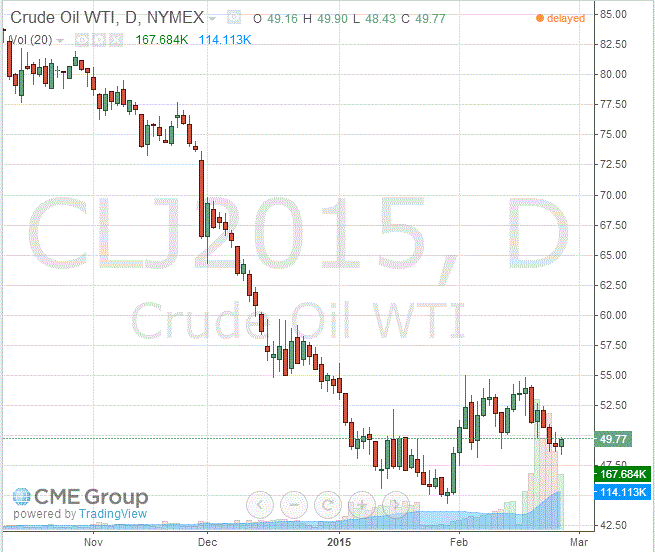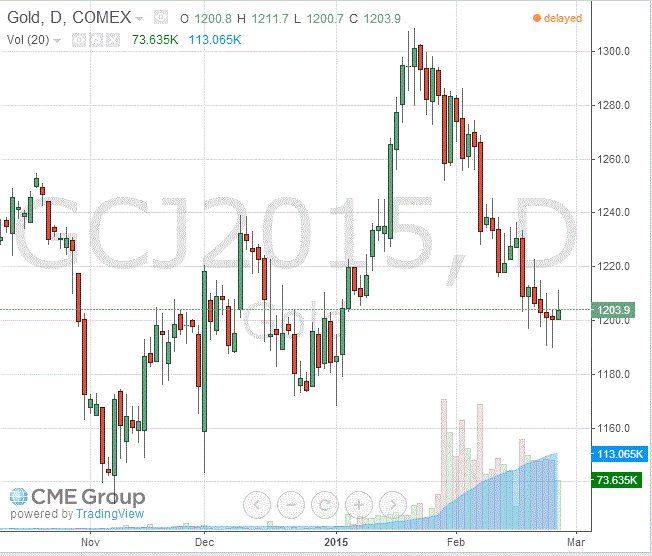Noticias del mercado
-
17:40
Oil: а review of the market situation
Brent oil prices rose moderately, entrenched above $ 59 per barrel, which helped the data for China, as well as statements by the Minister of the oil industry in Saudi Arabia. Meanwhile, the price of WTI crude oil lost part of the earned positions on the background of the report on stocks.
Recall preliminary PMI index in the manufacturing sector of China from HSBC / Markit for February rose to 50.1 against 49.7 in January. It was expected that the rate will drop to 49.6 points. Expansion of production and overall new orders was more rapid than in the previous month, but up new export orders declined, while the employment sub-index showed a more rapid decline than in January. "The data indicate a slight improvement in the industrial sector in China during the New Year celebrations. However, economic activity is likely to remain sluggish, and external demand looks uncertain, "- said economist at HSBC Qu Hongbin China.
Meanwhile, today Saudi Oil Minister Ali al-Nuaimi said that the demand for oil is growing. He also said that the oil market all the "easy". Saudi minister comments are very similar to the report of the Organization of Petroleum Exporting Countries, published in February. According to the report, the cartel expects to increase fuel consumption in the United States that will strengthen the demand for oil and may contribute to higher prices later in the year.
Higher prices also helped statement Fed Chairman Janet Yellen that the US central bank is willing to discuss raising interest rates "from meeting to meeting." According to some investors, this means that rates will not rise in June, as predicted by most analysts and later.
Pressure on the price of WTI crude oil has had a report from the US Department of Energy, which showed that during the week February 14-20 oil reserves rose by 8.4 million barrels to 434.1 million barrels, while the expected increase of 4.7 million barrels. Now stocks are at historical highs from August 1982. Oil reserves in Cushing terminal rose by 2.4 million barrels to 48.7 million barrels. Gasoline inventories fell by 3.1 million barrels to 240 million barrels. Analysts had expected a decline of 1.1 million barrels. Distillate stocks fell by 2.7 million barrels to 124.7 million barrels, while analysts had expected a decline of 3.3 million barrels. Utilization rate of refining capacity decreased by 1.3% to 87.4%. Analysts expected a decline of 0.5%.
It is worth emphasizing, oil prices have stabilized in recent weeks. But analysts note that the decline may continue as global supply still exceeds demand.
March futures price for US light crude oil WTI (Light Sweet Crude Oil) rose to 49.77 dollars per barrel on the New York Mercantile Exchange.
April futures price for North Sea petroleum mix of Brent increased by $ 0.93 to $ 59.63 a barrel on the London Stock Exchange ICE Futures Europe.
-
17:20
Gold: а review of the market situation
Gold futures rose moderately, further retreating from a seven-week low, after the Fed chief signaled that the rate increase is not inevitable. Yesterday Yellen said that the Fed will show flexibility in the timing of raising the base interest rate. She also emphasized that the changes in the formulation of positions Fed monetary policy should not be interpreted as an intention to necessarily raise rates at the next meeting. She added that sounded a statement on the results of the January meeting of the word "patience" that the Fed will show leadership with regard to interest rates, mean that their increase is unlikely "in the next couple of meetings." Among other things, the head of the Federal Reserve said risks to the US economy from other regions of the world. It is worth emphasizing, gold has been under pressure in recent weeks amid lingering expectations that this year, the Federal Reserve will raise interest rates. Expectations rise in interest rates has a negative impact on the dynamics of the price of gold, because it can not compete with earning assets at high rates.
Had little effect as of today's US data. The Commerce Department reported that sales of newly built, single-family homes fell by 0.2% compared to the previous month and reached a seasonally adjusted annual rate of 481 000. Economists had expected sales to fall to 477 000. The figures for the previous month was revised up level of 482,000 to 481,000 initial value, making December the strongest month since June 2008. Sales of new buildings account for about one-tenth of the total housing market, and monthly figures are often revised. The data showed that the weather could keep the housing market in the northeast. Sales of newly built, single-family homes in the region fell by 51.6% to an annual rate of 15 000, the lowest figure ever recorded. Sales in the West were lower, while the Midwest and South have recorded growth. Nationwide, the stock remains constant. Given the pace in January, it would take 5.4 months to exhaust the supply of newly built homes on the market. The average price of a house under construction was $ 294,300 in January, up 9.1% compared to $ 269,800 a year earlier.
Higher prices also helped by the fact that today many Chinese market participants returned after celebrating the New Year according to the lunar calendar, which lasted about a week. Since the beginning of the new year in China, experts expect an increase in demand for metals, including gold. Margins on the Shanghai Gold Exchange rose to $ 5- $ 6 per ounce to the spot price from $ 3- $ 4 before the Christmas holidays a week ago.
April futures price of gold on the COMEX today rose to 1203.90 dollars per ounce.
-
12:20
Oil: gains on comments of Saudi Arabia's oil minister on growing demand
Oil prices gained in today's trading on comments of Ali al-Naimi, Saudi Arabia's oil minister. He stated that markets are calm now and demand is growing. Better-than expected data from China, the world's second-largest oil consumer also supported prices. The HSBC Manufacturing PMI rose from 49.7 to 50.1 to a four month-high, above the estimated reading of 49.6. Brent Crude added +0.82%, currently trading at USD59.14 a barrel. On January 13th Crude hit a low at USD45.19. West Texas Intermediate added +0.63% currently quoted at USD49.59, still below USD50 a barrel. Prices were further supported by the FED's flexible approach to raise interest rates and by the fact Eurozone's finance ministers approved the four-month bailout extension on Tuesday and accepted the list of reforms proposed by the Greek government.
Today at 15:30 GMT Crude Oil Inventories will be closely watched. Yesterday API Crude Oil Inventories rose by 8.9 million barrels.
Still worldwide supply exceeds demand in a period of low global economic growth limiting the impact of positive macroeconomic news.
-
12:00
Gold prices back over USD1,200 after Yellen testimony
Gold halted a four-day decline and extended its rebound from 7-week lows in today's trading, back slightly above the USD1,200 threshold on FED rate outlook. Yellen testified before the Senate Banking Committee in Washington on Tuesday. She said it is unlikely that the Fed will raise its interest rate in "the next couple of FOMC meetings". A broadly weaker U.S. dollar supported the price.
A stronger U.S. dollar and the prospect for higher U.S. rates recently weighed on the precious metal as the precious metal is dollar-denominated and not yield-bearing.
The precious metal is currently quoted at USD1,206.60 +0,60% a troy ounce. Gold fell 2.3% last week, a fourth straight loss. On Thursday the 22nd of January gold reached a five-month high at USD1,307.40.
-
10:15
Press Review: Brent inches up toward $59 on Fed flexibility, China factory growth
BLOOMBERG
Draghi Winning Greek Respite Shifts Focus to Inflation Battle
(Bloomberg) -- A respite in Greece's bailout talks allows Mario Draghi to return his attention to the region's dismal price outlook.
Reform proposals by the Greek government, which the European Central Bank president described as a "valid starting point," have freed the ECB from immediate concern over funding the country's banks. That will give the institution scope to elaborate on the details of a 1.1 trillion-euro ($1.3 billion) quantitative-easing program designed to stave off deflation.
Draghi, who will attend the European Parliament in Brussels on Wednesday, is about to get data from Germany, Spain and Italy that will show a continued slump in consumer prices. The reports are a preamble to region-wide figures on Monday forecast to show prices falling at a near-record pace and new ECB projections due next week after a Governing Council meeting in Cyprus.
REUTERS
Brent inches up toward $59 on Fed flexibility, China factory growth(Reuters) - Brent crude edged up toward $59 a barrel on Wednesday, helped by better-than-expected Chinese factory activity data, the Federal Reserve's flexible stance on U.S. interest rates and the euro zone's approval of reforms proposed byGreece.
But U.S. crude was weaker after settling lower for the fifth consecutive session on Tuesday on the back of a bigger-than- anticipated crude stock build-up.
Brent had climbed 11 cents to $58.77 a barrel by 0751 GMT (2.51 a.m. EST), while U.S. crude futures fell 17 cents to $49.11 a barrel.
Source: http://www.reuters.com/article/2015/02/25/us-markets-oil-idUSKBN0LT08620150225
REUTERS
Germany's Schaeuble: credibility of new Greek plan still in doubtFeb 25 (Reuters) - Germany's Wolfgang Schaeuble said on Wednesday it had not been an easy decision for euro zone finance ministers to extend the Greek rescue plan by four months and much doubt remained about how credible Athens' latest reform commitments really were.
"It wasn't easy an easy decision for us but neither was it easy for the Greek government because (they) had told the people something completely different in the campaign and afterwards," the German finance minister told SWR2 radio in an interview.
Source: http://www.reuters.com/article/2015/02/25/eurozone-greece-schaeuble-idUSB4N0PT01I20150225
-
00:32
Commodities. Daily history for Feb 24’2015:
(raw materials / closing price /% change)
Oil 49.28 -0.34%
Gold 1,200.80 +0.29%
-


